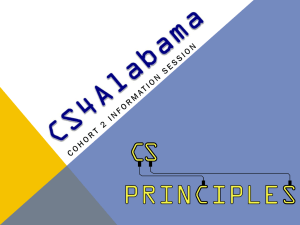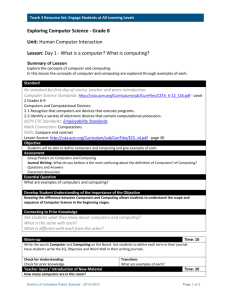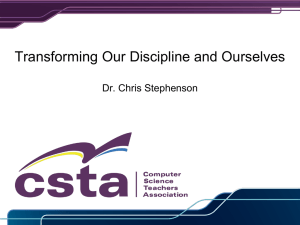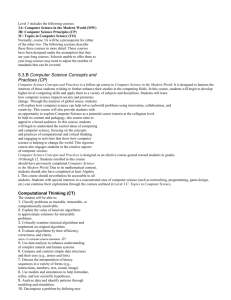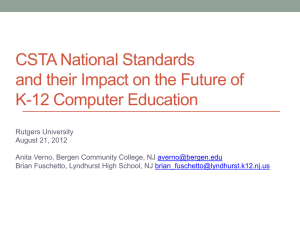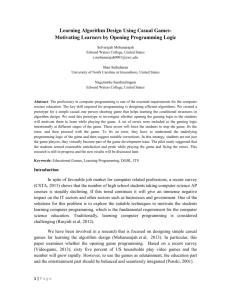ED BROAD REPORT
advertisement
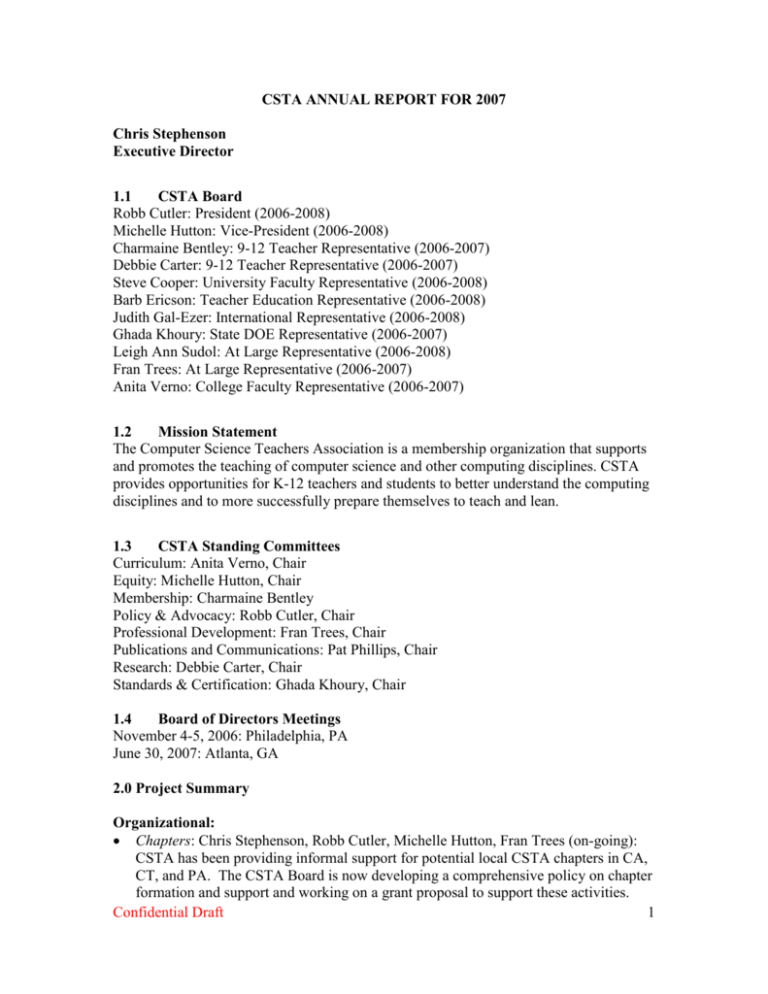
CSTA ANNUAL REPORT FOR 2007 Chris Stephenson Executive Director 1.1 CSTA Board Robb Cutler: President (2006-2008) Michelle Hutton: Vice-President (2006-2008) Charmaine Bentley: 9-12 Teacher Representative (2006-2007) Debbie Carter: 9-12 Teacher Representative (2006-2007) Steve Cooper: University Faculty Representative (2006-2008) Barb Ericson: Teacher Education Representative (2006-2008) Judith Gal-Ezer: International Representative (2006-2008) Ghada Khoury: State DOE Representative (2006-2007) Leigh Ann Sudol: At Large Representative (2006-2008) Fran Trees: At Large Representative (2006-2007) Anita Verno: College Faculty Representative (2006-2007) 1.2 Mission Statement The Computer Science Teachers Association is a membership organization that supports and promotes the teaching of computer science and other computing disciplines. CSTA provides opportunities for K-12 teachers and students to better understand the computing disciplines and to more successfully prepare themselves to teach and lean. 1.3 CSTA Standing Committees Curriculum: Anita Verno, Chair Equity: Michelle Hutton, Chair Membership: Charmaine Bentley Policy & Advocacy: Robb Cutler, Chair Professional Development: Fran Trees, Chair Publications and Communications: Pat Phillips, Chair Research: Debbie Carter, Chair Standards & Certification: Ghada Khoury, Chair 1.4 Board of Directors Meetings November 4-5, 2006: Philadelphia, PA June 30, 2007: Atlanta, GA 2.0 Project Summary Organizational: Chapters: Chris Stephenson, Robb Cutler, Michelle Hutton, Fran Trees (on-going): CSTA has been providing informal support for potential local CSTA chapters in CA, CT, and PA. The CSTA Board is now developing a comprehensive policy on chapter formation and support and working on a grant proposal to support these activities. Confidential Draft 1 International Outreach: Judith Gal-Ezer (on-going): Judith Gal-Ezer has been working on outreach with Mexico and several European Colleagues. At the request of ACM Education Board Chair Andrew McGettrick, Chris Stephenson presented at a workshop for CS educators in Great Britain who are looking at issues relating to K-12 computing education. Plans are also underway for a joint Symposium in Israel supported by Israel’s Ministry of Education to be held next year. Nominations and Elections: Michelle Hutton, Chris Stephenson (completed May 1, 2007): CSTA has completed its transition to a fully-elected Board of directors with representation from all levels of education. Financial Review: CSTA Board (completed June 30, 2007): The Board has completed its fiscal review of the operations, revenue, and expenditures for this first full year of CSTA operations. Policy manual: Chris Stephenson: A draft policy manual has been completed and is awaiting approval by the CSTA Board. Communications CSTA Voice: Pat Phillips, Chris Stephenson (on-going): Four issues of the CSTA Voice have been published and the response from members and interested faculty and industry representatives has been extremely positive. Advocate Blog: Chris Stephenson (on-going): The Advocate blog continues to build an audience. The CSTA Communications committee has undertaken to help increase and diversify the blog postings. The Communications Chair Leigh Ann Sudol is working with the ACM IT team on an RSS capability. Email Listserv: Chris Stephenson (on-going): CSTA been making good use of the ACM listserv capabilities to send targeted emails to members regarding CSTAsupported events in their areas. This has been especially helpful in distributing information about institutional members’ events. Funding Corporate Funding: Chris Stephenson (on-going): CSTA continues to build relationships with its corporate sponsors. Currently Microsoft, and Sun make annual donations to CSTA as Gold Level Sponsors in addition to funding specific partnership projects. Grants: In September we will enter into the third year of our BPC Operational grant. Are currently preparing materials to approach NSF to extend that grant. CSTA has also submitted an NSF grant proposal to the DRK-12 program, a joint proposal with Villanova University to the Pathways program and a proposal to Intel . SGB Funding: Chris Stephenson (completed February 5, 2007). ACM’s SGB voted to renew its commitment to provide $100,000 per year for three years. (This is the third year of its three-year commitment). Project Funding: Microsoft provided funding for the 2007 Computer Science and Information Technology Symposium. Microsoft, Sun, and Intel also provide funding for the original printing of the IT is All About Me poster. Membership Total Active Members: 4915 (4722 Individual, 193 Institutional) Confidential Draft 2 CSTA has moved into the second year of institutional memberships and that means renewing members are now required to pay a $200 yearly fee. We have also launched a major outreach program to encourage new institutional members to join and put in place a number of member benefits especially for institutional members. Projects Distribution of The New Educational Imperative: Improving High School Computer Science Education report to over 31,000 educators Panel/ White Paper Grant: Chris Stephenson: CSTA has submitted its final report on the white paper grant (The New Educational Imperative: Improving High School Computer Science Education). Computer Science and Information Technology Symposium: Chris Stephenson (completed June 28, 2007). The CSIT symposium, sponsored by Microsoft, was held on June 28th (directly following NECC) at the Omni CNN Hotel in Atlanta, GA. A total of 125 teachers attended this event. The speakers included Carla Faini of Microsoft and Andrew Williams and the Spelbots of Spelman Collegee. Evaluations from the event are now being tabulated and the results will be posted on the event website. CSTA Teacher Certification Research Project: Chris Stephenson, Ghada Khoury, Barb Erison (completed May 2007): CSTA completed its two year review of computer science teacher certification requirements in all US states and territories and released its final report. CSTA also developed a searchable database of state-level computer science teacher certification requirements, which is now available to CSTA members through the CSTA website. TECS Workshops: Fran Trees, Jennifer Wroblewski (completed January 2006): To date 55 JETT and 26 TECS workshops have been offered in partnership with colleges and universities. CSTA has also conducted an impact student with teacher participants. Equity Poster: Chris Stephenson, Michelle Hutton: The CSTA IT is All About Me poster has now been distributed to more than 24,000 teachers in the US, Canada, Mexico, Australia and New Zealand. Careers Brochure: Chris Stephenson, Middle School Volunteer Advisory team: The CSTA “Consider your future in computing” brochure has been created to inform middle school and early high school students about educational pathways and careers in computing. Careers Brochure: Chris Stephenson: CSTA worked with the ACM Education Board to help it test and disseminate a new careers brochure for high school students. Also worked with Canadian universities to create a Canadian version of the brochure. CSTA Member Benefits brochure: Charmaine Bentley, Anita Verno, Judith Gal Ezer: CSTA’s Membership Committee created a new Membership brochure describing how to access all of CSTA’s member benefits. This brochure is now included in the welcome package sent to all new members. 2nd edition of the ACM Model Curriculum for K-12 Computer Science: Chris Stephenson, Mark Guzdial, Dan Frost, Klaus Sutner, Lauire Williams. CSTA has issued a second edition of the Model Curriculum with a complete redesign and with a new foreword that address computer science knowledge and 21st century skills and Confidential Draft 3 important new methodologies for engaging all students. The Level III Outlines and Objectives document: Anita Verno and the CSTA Curriculum Committee: CSTA has created a new resource document to support classroom implementation of the ACM Model Curriculum. The Girls Gotta Have IT: Chris Stephenson, Michelle Hutton: CSTA spearheaded the development of a kit of equity resources distributed to 4000 teachers at the National Educational Computing Conference. This project was undertaken under the auspices of the NCWIT K-12 Alliance for which Chris served as a co-chair. Chapters: Robb Cutler: Completion of a CSTA Chapters policy document. 3.0 Plans 3.1 Projects to Be Completed in the Coming Year An expert white paper on workable models for computer science teacher certification. Using its current research as a starting point, CSTA will assemble a high level committee to look examine current issues in computing teacher certification, to examine the collected literature relating to teacher certification, to review current models of teacher certification and to recommend a variety of new models that would better ensue that all computer science teachers posses the requisite knowledge and skill to teach effectively and to engage a wide variety of students. Web Repository: Debbie Carter, Joe Kmoch, Chris Stephenson, Boots Cassel (ongoing): CSTA’s new web repository of K-12 computer science teaching and learning materials was debuted at the National Educational Computing Conference and the AP National Conference. The web repository uses a classification scheme keyed to the ACM Model Curriculum for K-12 Computer Science and provides an easy-to-use interface for searching, retrieving and submitting resources. Content management is provided by a volunteer Steering Committee. CSTA has joined with several institutions, including Villanova University, in a Pathways grant proposal intended to support teacher awareness and training for the repository. CSTA National Survey on High School Computer Science Education: Debbie Carter (expected completion September 2007): The Research Committee is now tabulating and analyzing the results of a 14,000 high school computer science and programming teachers across the country. The committee will be releasing a the results of this study in addition to a major report on any trends that might be apparent since CSTA last national study in 2004. Member Communications: CSTA Board (beginning July 10, 2006 – Expected completion September 1, 2007). The CSTA Board is considering two new outreach sources to improve direct communication with members: an opt-in listserv and a community forum. Confidential Draft 4 3.2 Changes or Milestones in Projects: None anticipated 3.3 New Projects Local Chapter development: CSTA will be appointing a special committee chair to the CSTA Board of Directors with the responsibility of building and supporting local CSTA Chapters. Web Repository Workshops: If funding permits, CSTA will set up workshops to train teachers in developing teaching and learning materials for inclusion in the CSTA Source web repository. Engaging K-12 Workshop for Colleges and Universities: If funding permits, CSTA will set up a one-day workshop that will help colleges and universities improve their outreach to K-12. Topics will include: how to find teachers, creating outreach materials, and evaluation for improvement. CSTA is planning to launch a new community outreach projects with Spelman Colleges and the Historically Black Colleges and Universities whereby CSTA will serve as a national repository and dissemination site for materials and best practices designed to increase the inclusion of African American students in computer science. CSTA is planning to create a new Outlines and Objectives document to support implementation of the Level I course described in the ACM Model Curriculum. CSTA will be working with Tami Lapidot and the Israel Ministry of Education to organize a Computer Science Symposium for Teachers to be held in Israel in December. Chris Stephenson and Robb Cutler will be presenting on behalf of CSTA. CSTA plans to create a new Careers in Computing poster in partnership with several universities. The plan is to create the camera-ready artwork for a poster that includes space for each university to include its own institutional messaging. CSTA institutional members will be able to print the poster and distribute it to local schools. 3.4 Recruitment Plans CSTA has been fortunate to attract several young and dynamic teachers to its Board and committees. Although recruitment has not been a problem to date, we feel it is very important to focus on developing the leadership skills of these younger volunteers by placing them in positions of responsibility and helping them to grow into those positions through mentoring. Confidential Draft 5 Appendix A: CSTA Board Contact Information Robb Cutler (Chair): robbc@harker.org The Harker School 500 Saratoga Ave. San Jose CA 95129 Michelle Hutton (Vice-Chair): mfh@pobox.com Computer Science Teacher The Girls' Middle School 423 Dell Avenue Mountain View CA 94043-2711 Charmaine Bentley: charmainebentley@acm.org. Roosevelt High School, Dallas I.S.D. 525 Bonnie View Rd. Dallas TX 75203 Debbie Carter: carter@e-lcds.org Computer Teacher Lancaster Country Day School 725 Hamilton Road, Lancaster, PA 17603 Steve Cooper: scooper@sju.edu Dept. Mathematics and Computer Science Saint Joseph's University Home: 433 Clairemont Road Villanova PA 19085 Barb Ericson: ericson@cc.gatech.edu College of Computing Georgia Institute of Technology 3015 Arbor Chase Decatur, GA, 30033 Judith Gal-Ezer: galezer@cs.openu.ac.il Computer Science Department The Open University of Israel 108 Ravutski Street., PO. Box 808 Raanana 43107, Israel Ghada Khoury: khouryg@michigan.gov Higher Education Coordinator Office of Professional Preparation Services Michigan Department of Education 608 Allegan Street Lansing, MI 48909 Leigh Ann Sudol: ljervis@bedford.k12.ny.us Fox Lane High School Confidential Draft 6 Home: 89 Columbus Ave. #1A, West Harrison, NY 10604 Fran Trees: ftrees@drew.edu Lecturer, Mathematics & Computer Science Dept. Drew University 36 Madison Avenue Madison NJ 07940 Anita Verno: averno@bergen.edu Assistant Professor, Information Technology Bergen Community College 400 Paramus Road Paramus NJ 07652 Confidential Draft 7
